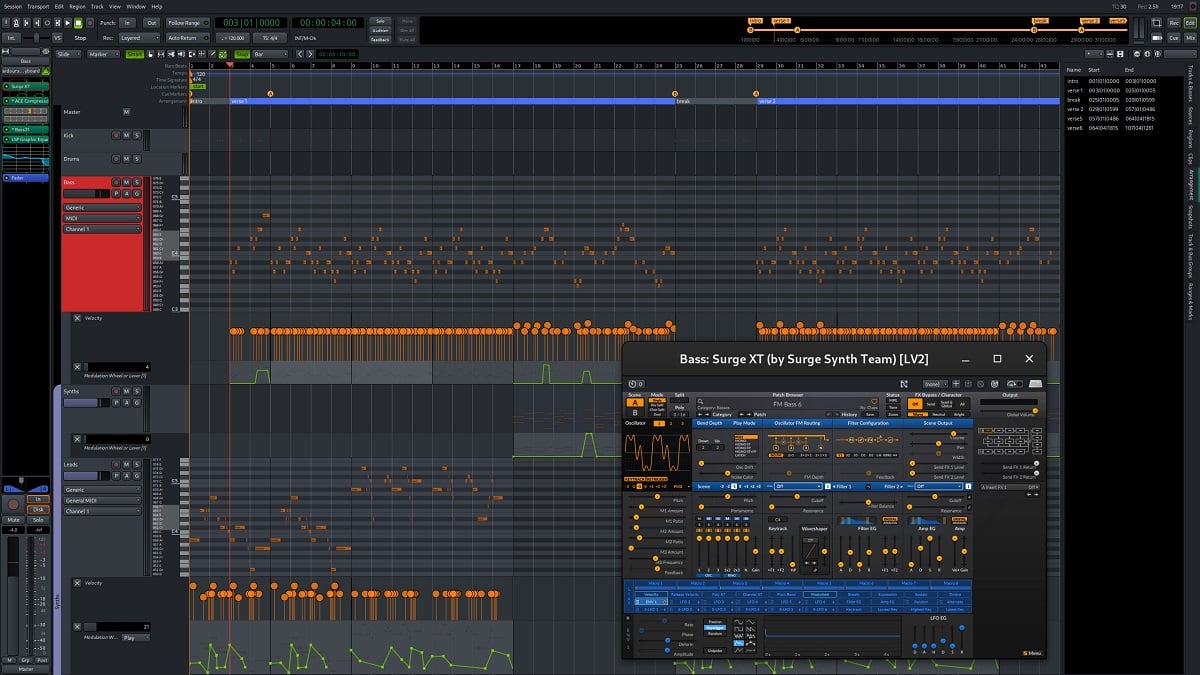Free and open-source digital audio workstation Ardour is updated to version 8.0, including several new features and improvements.
Fans of the free and open-source digital audio workstation Ardour have plenty to celebrate this week! October 8th marks the release of Ardour 8, and the new version brings a bevy of interesting and useful features to the mix.
With Cakewalk by Bandlab not being free anymore, the free DAW market is dominated by Waveform Free. However, it still has a fair share of competitors, one of which is Ardour.
If you’re unfamiliar, Ardour is a freely available DAW that runs on the likes of Linux, Windows, and Mac computers. There isn’t an implicit need for any donation, but you’re certainly aiding development when making any sort of monetary contribution.
With that out of the way, let’s take a look at what is new in the world of Ardour.
First up on the feature list is the support of lollipops for MIDI velocity control.
Ardour has had a variety of different ways of adjusting velocity in previous iterations, but the lollipop inclusion is a quick workflow for users swapping from other DAWs. They’re particularly easy for controlling things like crescendos.
A ruler has been introduced for marking sections of an arrangement, which is always a helpful thing. I really enjoyed making markers for regions with the ruler, it reminds me quite a bit of how Reaper has implemented a similar system.
The MIDI header for the piano roll has been revamped, with easily seen MIDI note values as well as their actual names visible at all times.
Ardour 8 also comes with support for the Launchpad Pro, letting users use it to control clips and cues, and use it as a general interface for recording note data. Functionality hasn’t yet been extended to the Launchpad Pro X or Mini, sadly.
However, perhaps my favorite inclusion for this update is the quick groups. Ardour has previously had bus groups that allow users to quickly solo, enable record, and most other functions you can think of.
The new quick groups allow for a faster selection of tracks or elements of a group. It also comes with a redesigned VCA that can operate in parallel or in a hierarchical fashion.
Now, it remains to be seen when the newest features will migrate to the likes of Harrison Mixbus, but you can test out the new functions in Ardour for yourself today.
Download: Ardour 8.0 (FREE)
More:



19 Comments
Over
onIt’s open source but not free. You have to pay something if you want to download binary installer. Otherwise you can download its source code and build it yourself.
alex
onI like that about Ardour. You want it for free – you gotta learn something and since the people are getting dumber since the 90s, that’s a good way to make them use their brains.
Illford
onWho, besides people interested in software and computers, would know that anyways?
Numanoid
onAnd once you have built it you have to deal with JACK ;-)
Paul Davis
onThis is incorrect. Ardour has not required JACK for years, on any platform.
Numanoid
onOK, good to know
Brian
onAwesome! Fact checked by THE man!
MRG
onThere’s only one man left? Oh my!
Derrick
onSi tiene versión gratuita, sin limitaciones lo único es que aparecerá un anuncio cada 10 minutos de que si deseas apoyar con Ardor, pero también esta el plan de licencia perpetua hasta dicha versión, donde lo mínimo es 30 usd y tope promedio 45 usd, pero también puedes estar comprando por 5 usd o menos, y esta el plan suscripción que este desde 1 usd en adelante mensualmente.
Eu
onPuedes donar 1 €, descargarlo y ya.
KariK
onThe minimum donation to get the installation binary is 1 (one) dollar. So it’s practically free, unless you want to support the developers with more $$$.
Over
onThe question is not about price, but definition.
Arthur
onOr you can download demo with every 10 minutes silence gaps..hm
Celilo
onPacman -S ardour
How hard was that?
MRG
onYou forgot the “btw”, btw.
And yes, some Linux distros provide their own binaries, not in demo version.
IIRC there used to be someone doing that for Windows, but I can’t find it back (or I’m just wrong and think of something else, sorry).
Numanoid
onIMO Bitwig is the most friendly DAW on Linux, and 8-track is often given away free.
LMMS is also good.
Jaaba
onYou wrote that Cakewalk wouldn’t be free anymore. I just visited the Cakewalk site and they say it’s free. What have I missed?
MRG
onHere on BPB, June 6, “BandLab Will Discontinue FREE Cakewalk DAW, Sonar Returning”.
The way I understand it, they’re retiring “Cakewalk” as a DAW and brand, and ressurect “Sonar” at some point in the future, until then Cakewalk is still available. They say Cakewalk should still work after Sonar is released, but I find it very unclear if you can still (re)install it at that point. :/
Jaaba
onMRG, thanks for pointing me to the article. I wasn’t a subscriber at BPB at that time, hence my question.